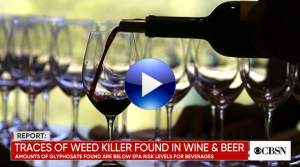Traces of Monsanto-Bayer’s Weed-Killing Chemical Discovered in Popular Wines and Beers
Traces of Monsanto-Bayer’s Weed-Killing Chemical Discovered in Popular Wines and Beers
March 3, 2019 - Vineyards use Roundup, a herbicide formerly owned by Monsanto before the company was purchased by Bayer.
A chemical used to kill weeds could be in your favorite wine or beer.
Trace amounts of glyphosate, the active ingredient in Bayer’s herbicide Roundup, a weed killer, are showing up in wine and beer, according to a new report from the U.S. Public Research Group (USPIRG) Education Fund. The herbicide was owned by Monsanto before the company was purchased by Germany’s Bayer AG.
USPIRG tested 20 products — five wines and 15 beers — and found traces of the carcinogen in 19 of them. The tested wines included Beringer, Barefoot and Sutter Home and the beers included: Budweiser, Coors,
USPIRG tested 20 products — ve wines and 15 beers — and found traces of the
carcinogen in 19 of them. The tested wines included Beringer, Barefoot and Sutter
Home and the beers included Budweiser BUD, +4.86% Coors TAP, +0.26% Miller Lite,
Sam Adams SAM, -2.46% Samuel Smith Organic and New Belgium.
The highest levels of glyphosate were found in St. Helena, California-based Sutter
Home wine ($5.99 per bottle), which contained 51 parts per billion, according to the
report. The widely available brand is sold at Target TGT, +0.41% Walmart
WMT, -1.07% and convenience stores.
Organic wines and beers contained the glyphosate
Beringer Founders’ Estate Moscato ($5.99) contained 42.6 ppb; and Barefoot
Cabernet Sauvignon ($5.99) contained 36.3 ppb. Conventional beer brands including
Coors TAP, +0.26% ($5.79 per six pack); China’s second largest brewery, Tsingtao
($7.89 per six pack); and Miller Lite ($8.99 per six pack) all showed glyphosate levels
above 25 ppb.
While glyphosate is not allowed in organic farming, several organic products were
contaminated, according to the report, including Samuel Smith Organic Cider
($14.99), which had 3.5 ppb; and Inkarri Estate organic wine ($12.98), which contained
5.2 ppb; and Frey Organic Natural White wine ($9.99), which contained 4.8.
One organic beer brand, Peak Organic IPA ($10.99 per six pack) did not contain any
detectable levels of glyphosate, according to the report.
Three of the companies whose beverages were tested responded to requests for
comment from MarketWatch. Wine label Beringer acknowledged the potential for
herbicides to appear in “trace amounts” in its wine. “Glyphosate is an approved
herbicide widely used by farmers around the world,” said Beringer spokesman Jim
Caudill. “The miniscule trace amounts of glyphosate that may be present in wine from
use on vineyard weeds are well within the safe level that the U.S. Environmental
Protection Agency has established.” source Market Watch
The underlying problem is that how many other products which are deemed "organic" or non-organic contain small amounts of Roundup Bayer’s weed-killing chemical (glyphosate) do we consume which then increases our overall intake of glyphosate?

